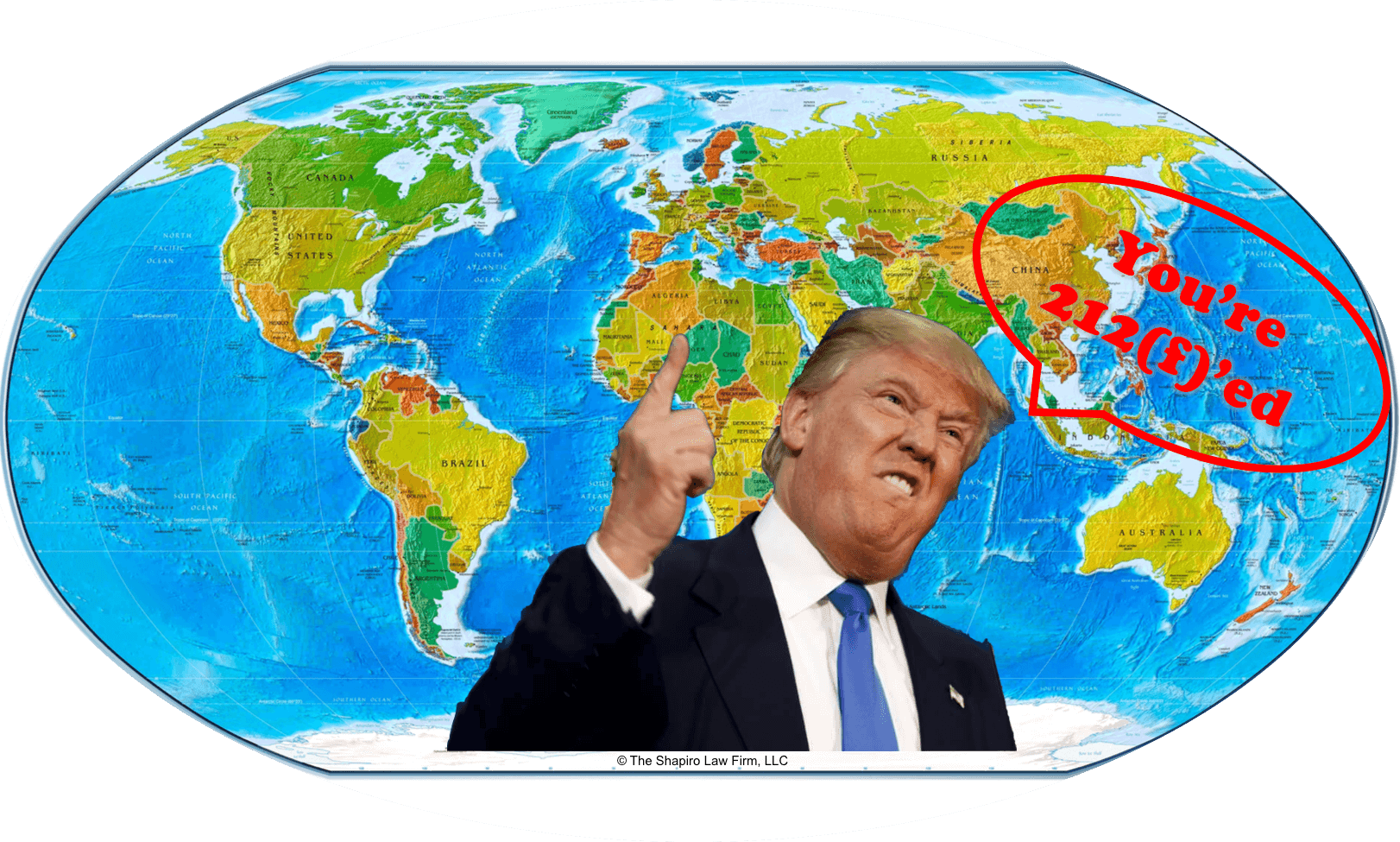Who Did President Trump 212(f) today? | New ESinQuire Blog Series

Who did Trump 212(f) today?
Welcome, to the new The ESinQuire Blog series, “Who did Trump 212(f) today?”
What is 212(f)?
212(f) refers to section 212(f) of the Immigration and Nationality Act, (“INA”). Trump cites to INA § 212(f) in his latest executive order entitled, “Protecting the Nation from Foreign Terrorist Entry into the United States."
212(f) essentially allows the President to unilaterally restrict or suspend entry of said foreign nationals into the United States.* So, the President can basically ban any non-U.S. Citizen from entering the Untied States at any time and the Supreme Court has very little power to review his decisions when challenged in court.. INA § 212(f) is entitled, "Suspension of entry or imposition of restrictions by President," and it authorizes the President to ban a non-citizen or group of non-citizens from entering the United States if he finds that allowing them in will be "detrimental to the interests of the United States."
You may be surprised to learn that our law vests this vast power in the hands on one man or woman. As an immigration lawyer, I have read the INA a dizzying amount of times and I never even looked twice at this section. Presidents have invoked 212(f) in the past, even controversially so (see, Sale v. Haitian Centers Council, 509 U.S. 155 (1993)).
For example, INA 212(f) has been invoked to ban North Korean government officials; aliens whose actions “threaten the peace, security or stability of Libya;” and aliens response for “serious human rights violations.”
Trump, however, is arguably taking the President’s authority pursuant to 212(f) to a whole new level, specifically in regards to the sheer number of people potentially effected by it. By listing entire nations (all of which are of muslim majority), rather than specific groups of people, Trump has opened the door to Constitutional challenges.
Is INA § 212(f) Constitutional?
Good question. This specific issue has yet to be challenged in the Courts. Challengers will most likely find it hard to convince the Supreme Court to agree that 212(f), in general, is unconstitutional given the fact that the President has broad authority to enforce immigration laws Thus, 212(f) is seen simply as providing the President a vehicle to exercise his constitutional duty of enforcing the immigration law.
But that still does not mean that a President can use 212(f) to discriminate, right?
Right. Although it is unlikely that the Supreme Court will strike down the entire section of 212(f) as unconstitutional, hope lies in attacking the vague and ambiguous nature of the statue on a case-by-case basis. In other words, the fact that the law itself is constitutional does not automatically mean that enforcement of that law is also consitutional. How the law is enforced involves a separate constitutional question. Just like the law itself, the laws must be carried out in an equal and non-discriminatory manner.
So, a constitutional challenge to Trump's 212(f) list will need to focus on the President non-discriminatory reason for concluding that allowing any foreign national from a particular country is "detrimental to the interests of the United States."
So, the new The ESinQuire Blog series, “Who did Trump 212(f) today,” will keep you up-to-date on President Trump’s list of countries whose citizens are now banned from the United States and break down both sides of the constitutional arguments surrounding the 212(f) country list.
Who did Trump 212(f) so far?
Now for the first 7 countries on Trump’s 212(f) list…Syria, Iraq, Sudan, Iran, Somalia, Libya, and Yemen.
Notably, the ban on Syrian nationals is the only country actually listed in Trump’s January 27 executive order, which suspends entry by Syrian refugees indefintely. Syria is named again, along with Iraq, Sudan, Iran, Somalia, Libya, and Yemen in a Fact Sheet released by the Department of Homeland Security (DHS) 2 days later to supplement the initial executive order and provide further guidance.
*The other sentence of this section instructs the Attorney General to suspend entry into USA to non-citizens who flew on a particular commercial airline if the attorney general finds that the airline failed to meet the requirements to detect fraudulent documents used by passengers.
If you are a national of a 212(f) country and are worried about how the travel ban will effect you, contact an attorney at The Shapiro Law Firm today for more information.
**Attorney Advertising** Please be advised that that all information provided above is general in nature and does not create an attorney-client relationship.**Attorney Advertising**




